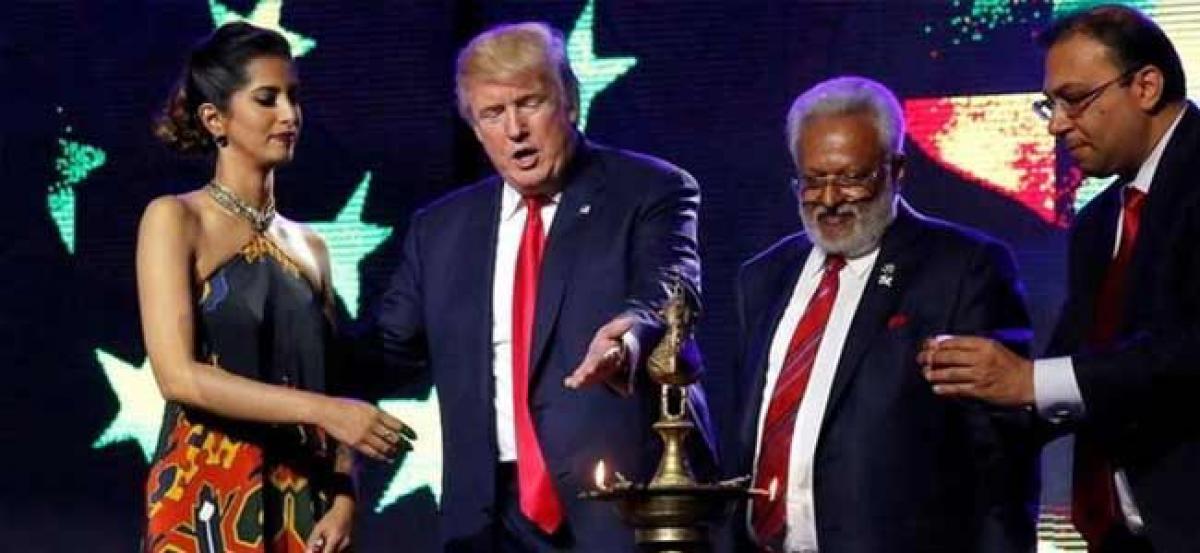Live
- ‘Sankranthiki Vasthunnam’ locks release date
- How Individuals Can Contribute to Environmental Conservation Efforts and Make a Difference
- Smart Logistics: Leveraging AI for Real-Time Decision Making and Route Optimization
- ‘Bachhala Malli’ set for Dec 20 release
- ‘Devaki Nandana Vasudeva’ creates buzz
- My role in ‘Mechanic Rocky’ will be very unique: Shraddha Srinath
- Bhagyashi Borse comes onboard for ‘RAPO22’
- BGT 2024-25: Yash Dayal added to Indian team’s pace bowling reserve list after Khaleel Ahmed gets injured
- Centre urges southern states to fast-track schemes to boost farm sector
- Karnataka government will promote more industries: DCM DK Shivakumar
Just In

A year after President Donald Trump\'s election, there has been a substantial increase in hate violence against South Asian, Muslim, Sikh, Hindu, Middle Eastern, and Arab communities in the US, a report said today.
A year after President Donald Trump's election, there has been a substantial increase in hate violence against South Asian, Muslim, Sikh, Hindu, Middle Eastern, and Arab communities in the US, a report said today.
Between November 9, 2016 and November 7, 2017, the not- for-profit group South Asian Americans Living Together (SAALT) said in a report that it recorded 302 incidents of hate violence and xenophobic political rhetoric aimed at these communities.
This is an over 45 per cent increase from its previous analysis in just a year, SAALT said, adding that this has not been seen since the year after the attacks of September 11, 2001.
This breaks down further into 213 incidents of hate violence and 89 instances of xenophobic political rhetoric of which 248, or an astounding 82 per cent, were motivated by anti-Muslim sentiment, it said.
One in five perpetrators of hate violence incidents referenced President Trump, a Trump policy, or a Trump campaign slogan, underlining a strong link between the president's anti-Muslim agenda and hate violence post- election, the SAALT said.
Suman Raghunathan, executive director of SAALT alleged that through its policies and rhetoric, the Trump administration's incessant demonisation of Islam has created an environment of hate and fear-mongering for Muslims and those perceived to be Muslim.
"Deadly shootings, torched mosques, vandalised homes and businesses, and young people harassed at school have animated an acutely violent post-election year. This administration must break eye contact with white supremacy if our nation is to live up to its highest ideals of religious freedom," Raghunathan said.
The report, among other things, underlines the way intersectionality informs hate - both the identities of victims targeted and the systems that criminalise communities.
Women who identify or are perceived as South Asian, Muslim, Sikh, Hindu, Middle Eastern, or Arab were the targets of attack in 28 per cent of the 213 documented hate incidents post-election, it said.
Of the 213 incidents of hate violence documented, one in five perpetrators invoked Trump's name, his administration's policies, or his campaign slogans during attacks, it claims.
Women who wear hijab or head scarves are particularly vulnerable, accounting for 63 per cent of the documented hate incidents targeting women.
The report discusses the intersection of immigration, racial profiling, surveillance, and criminal justice policies that compound against communities.
"The growth of white supremacist hate groups and mounting attacks on our communities are proof positive that this administration's anti-Muslim agenda is not making America great, it's making Americans afraid," Raghunathan said.

© 2024 Hyderabad Media House Limited/The Hans India. All rights reserved. Powered by hocalwire.com







